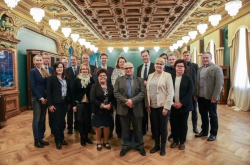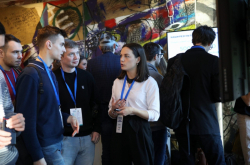Creativity at job interviews
Many see job interviews as some formal inspection. Yet, only a few of those who come to these "inspections" actually get the job. Why? Well, they are the ones who succeed in demonstrating their skills and personal qualities during the interview.
Vadim Fedotov, CEO of Gazprom-Media Technology, analyzes each candidate with regard to his behavior in three "time planes": past, present, and future. The first impression is made by a candidate's present behavior. This has to do with the interview itself; for instance, 60% of the candidates can't tell whom of Gazprom's staff they've talked to before coming to the interview. Most say something like: "Some girl called me, then I talked to your secretary and some guy showed me the way here." Mr. Fedotov believes that failure to remember the name and position of these people is already a setback.
A candidate's "past behavior" is his resume. If a person has worked in some 10 companies for the past year, that's bad. If they actively participated in different projects and were successful at it - that's great. As for those who don't have any work experience - students, for instance - a good thing to do is make a list of different events they've participated in - conferences and such. Another good idea is getting some recommendations from professionals in a particular field. Mr. Fedotov states that even recent graduates have a chance to start their careers with Gazprom-Media Technology.
 Vadim Fedotov
Vadim Fedotov
Lastly, the "future behavior" is about what a candidate has to offer. The employer has to understand how the candidate will be useful for the company, how will he help solve its tasks. Also, the potential employee has to be familiar with the technologies that are used in his field. If we're talking marketing, the candidate has to know how to expand the target audience, what new methods can be used to promote the product. The ideas can be most vivid. Vadim Fedotov shared a story about how a new restaurant's owner that had "ape" in its name decided to promote it by spending a whole day running around the city in an ape costume and occasionally hiding in the restaurant.
"When you come to work at our company, you come to spend our stockholder's money. And that's normal - I did that as well. If you think, you reason during the interview, it's good - even if your reasoning turns out to be wrong. That is a good start, anyway. Most think that all they have to do during an interview is show themselves - but what you really have to do is "sell" yourself. As for me, I use a personalized approach. Some candidates worry not because they lack skills, but simply because it's an interview, but in some fifteen minutes they start to show who they really are" comments Mr. Fedotov.
He adds that initiative is also very important: it's better to ask forgiveness rather than permission. For investors, it is always easier to involve themselves in some successful project rather than develop some idea from scratch. Same goes for working with investors, as well: most of them are ready to invest in prototypes that have already been tested in the market to a certain extent rather than just ideas. The product can still be in development stage, but its team has to have a good marketing strategy.
Be more creative than any machine
Robotization is no longer something of science fiction - it is already here. Yet, robots will never replace talented PR-specialists, believes Vera Sivacheva, Client Service Director of Rodnya PR Studio. Robots will help with some processes that don't require creativity - for instance, form mailouts based on data from the Internet. Yet, even such monotonous work as e-mailouts will not go to neural networks.

"PR specialists feared that robots will replace them, and social networks will take all the profits from advertising. Well, they were right to fear that. Yet, new technologies never extruded PR as a professional field - only those specialists that lacked in spirit. Those who feared being replaced by robots worked as robots, to begin with," comments Vera Sivacheva.
She adds that social networks even made PR specialists' lives easier. It became easier to reach out to a particular person and monitor the interests of particular groups. Vera Sivacheva spelled the four basic rules that any person who doesn't want to be out of touch with digitalization and robotization should adhere to.
#1. Think outside the box. Even if you just have to send some e-mails, it is better to first think whom you better send e-mails to, and whom you'd better call. Also, ask yourself whether this mailout can give any results, or maybe it is a big PR-company that you need right now?
#2. Learn your audience's language. If you work with particular groups of people, speak their language, know what can have the most effect on them.
 Vera Sivacheva
Vera Sivacheva
#3. Enter any situation and use them. For instance, Rodnya PR Studio had this campaign that had to do with delivering a gigantic figure - a symbol of a certain brand - to Russia. It was seven meters high and made its way from Germany to Russia. The process was actively covered in social networks: how it passed the border, how it was welcomed in Moscow, how it made its way along the Moscow river; all of that became a great story that was told by many different media.
#4. Be ready for everything. You need a PR-event during the president's speech? Easy as pie! Vera Sivacheva told a real story when during the president's speech that was translated by several radio channels short signals that sounded like autobot Optimus Prime were added to it; all of that was part of a certain PR campaign. Next day, there were news items about aliens trying to interfere with the president's speech - all for boosting the public interest towards a particular topic.
Our high-tech future
Robotisation brings up many complex ethical and moral problems that have to do with not just losing jobs - some of those are life-or-death issues. And we better start discussing them before the authorities will try to regulate them, believes Anna Krongauz, Editor of N+1 popular science website. It is a lot more effective when the state just enshrines some established norms. This way, it is a lot easier to introduce new laws and avoid possible mistakes.

So, what are the technology-related problems our society will have to solve? Ethical issues are the essential ones - and lots of those have emerged. One of the most popular is how developers should program driverless cars to kill. That sounds horrific, yet they will have to do it - in case of an accident which will certainly lead to someone dying, people act at random; yet, a program will have to act according to some algorithm, i.e. choose who's going to die and who isn't.
Scientists approach this problem in different ways. Some propose developing an algorithm based on statistics of drivers' behavior during different accidents. For instance, drivers often turn their cars so as to be hit on its right side; yet, who's gonna take the right seat after an algorithm will mark it as doomed?
Though driverless cars are yet to become widespread, there are other technology-related problems. For instance, in Moscow, an artist was arrested for wearing a VR headset in a public place and even hospitalized in an asylum.
"It's an interesting question, whether you have the right to confuse reality or not? You won't hinder anyone by it, would you? Or can you click the "like" button for anything you want? There already is a person who was arrested for "liking" a certain post on Facebook," comments Anna Krongauz.
 Anna Krongauz
Anna Krongauz
Another interesting example is sports sneakers that electrocute their owner when he toes in an improper manner. Is it right to school people like that? Won't it limit us? There've been cases when sportsmen went against a certain technique and achieved better results. In the end, can we deprive people of their right to make mistakes?
"We will have to define the borderline between being human and robot. For instance, to which extent can we replace our body parts before we can be perceived as robots? Who will regulate robot rights, and do they need any? Can a robot become a foster parent?" such were the examples of the relevant issues of the future given by Ms. Krongauz. To try solve them, N+1's editor has recently launched the New Ethics project.





